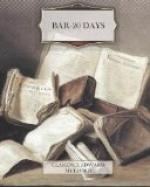“Hee, hee, hee! Yo’re a droll feller, Charley,” chuckled Old John Ferris, rubbing his ear with unconcealed delight. “That’s a good un.”
“One drink, now,” growled Hopalong, mimicking the proprietor, and glaring savagely at the “droll feller” and his companion. “An’ mind that it’s a good one,” he admonished the host.
“It’s better,” smiled Stevenson, whereat Old John crossed his legs and chuckled again. Stevenson winked.
“Riding long?” he asked.
“Since I started.”
“Going fur?”
“Till I stop.”
“Where do you belong?” Stevenson’s pique was urging him against the ethics of the range, which forbade personal questions.
Hopalong looked at him with a light in his eye that told the host he had gone too far. “Under my sombrero!” he snapped.
“Hee, hee, hee!” chortled Old John, rubbing his ear again and nudging Charley. “He ain’t no fool, hey?”
“Why, I don’t know, John; he won’t tell,” replied Charley.
Hopalong wheeled and glared at him, and Charley, smiling uneasily, made an appeal: “Ain’t mad, are you?”
“Not yet,” and Hopalong turned to the bar again, took up his liquor and tossed it off. Considering a moment he shoved the glass back again, while Old John tongued his lips in anticipation of a treat. “It is good—fill it again.”
The third was even better and by the time the fourth and fifth had joined their predecessors Hopalong began to feel a little more cheerful. But even the liquor and an exceptionally well-cooked supper could not separate him from his persistent and set grouch. And of liquor he had already taken more than his limit. He had always boasted, with truth, that he had never been drunk, although there had been two occasions when he was not far from it. That was one doubtful luxury which he could not afford for the reason that there were men who would have been glad to see him, if only for a few seconds, when liquor had dulled his brain and slowed his speed of hand. He could never tell when and where he might meet one of these.
He dropped into a chair by a card table and, baffling all attempts to engage him in conversation, reviewed his troubles in a mumbled soliloquy, the liquor gradually making him careless. But of all the jumbled words his companions’ diligent ears heard they recognized and retained only the bare term “Winchester”; and their conjectures were limited only by their imaginations.
Hopalong stirred and looked up, shaking off the hand which had aroused him. “Better go to bed, stranger,” the proprietor was saying. “You an’ me are the last two up. It’s after twelve, an’ you look tired and sleepy.”
“Said his wife was sick,” muttered the puncher. “Oh, what you saying?”
“You’ll find a bed better’n this table, stranger—it’s after twelve an’ I want to close up an’ get some sleep. I’m tired myself.”
“Oh, that all? Shore I’ll go to bed—like to see anybody stop me! Ain’t no rocks in it, hey?”




